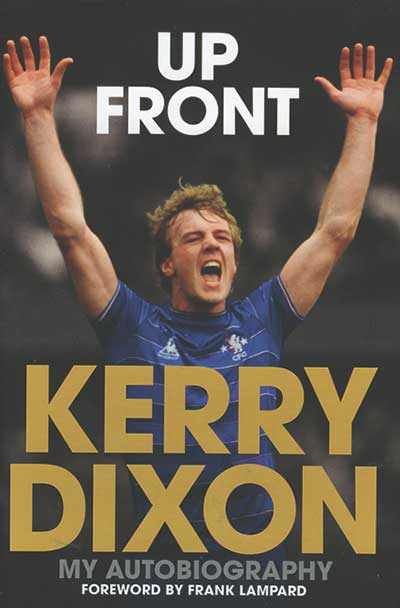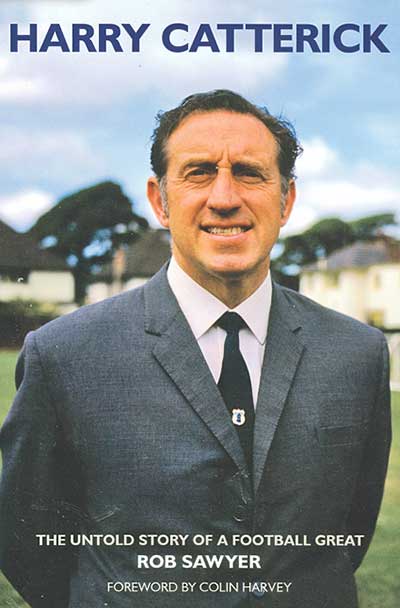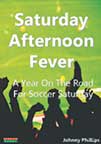
with Harry Harris
John Blake, £17.99
Reviewed by Mike Ticher
From WSC 359, January 2017
Buy this book

with Harry Harris
John Blake, £17.99
Reviewed by Mike Ticher
From WSC 359, January 2017
Buy this book
2 August ~ “I’ll be pleasantly surprised if we make the play-offs,” said Wigan fan Ian Aspinall ahead of the 2015-16 League One season, after pointing to their high turnover of players, untried manager and the League’s youngest chairman. Ian must have been amazed, then, when his team were promoted as champions come May, top scorers in the league thanks in large part to the form of Will Grigg. It won’t as come as much of a shock to the other League One contributors, however, who had Wigan down as runners-up.
 The untold story
of a football great
The untold story
of a football great
by Rob Sawyer
De Coubertin Books, £18.99
Reviewed by Simon Hart
From WSC 340 June 2015
It was 30 years ago in March that Harry Catterick died after suffering a heart attack at Everton’s FA Cup quarter-final against Ipswich Town. Five years earlier, Dixie Dean had also died at Goodison Park yet unlike the nationally famous striker, Catterick’s achievements – building two League title-winning teams – are today largely ignored beyond Merseyside.
Rob Sawyer has sought to redress the balance in a well-crafted biography that begins with a foreword from Colin Harvey, part of Catterick’s 1970 Championship side. “Don Revie, Bill Shankly, Bill Nicholson and Sir Matt Busby all get mentioned as being the great managers of the era while Harry doesn’t,” says Harvey of a man who won as many Leagues and FA Cups as Revie.
It is with Shankly, though, that Harvey makes the most telling comparison. For half of his 12-year reign, Catterick’s Everton drew the bigger crowds on Merseyside yet as Harvey recalls: “The press enjoyed being courted by Bill Shankly, but Harry was an introvert and snubbed them.” This is the crux of his image problem. Here was somebody who refused to allow the BBC cameras in to film Match of the Day until 1967 and had none of the charisma of his rival. Catterick was an aloof figure more akin to a modern-day director of football who – as his players would joke – put on a tracksuit only when the TV cameras or chairman John Moores appeared.
To achieve this insightful portrait, Sawyer pieced together interviews given by Catterick himself along with reminiscences of players and journalists and contemporary press cuttings. Alex Young recalls the coldness of a man not interested in courting popularity, saying: “I never got a pat on my head.” He had a devious side too, lying to the press and his own players; he told midfielder Brian Harris, for instance, that rumours of Tony Kay joining were false, only to swoop later that day for a player who had helped his Sheffield Wednesday side finish Division One runners-up in 1960-61.
Yet while his 1963 title-winners, built with the largesse of Littlewoods tycoon Moores, were dubbed “cheque-book champions”, the vision behind his youthful 1970 team would fit most current ideas of how to play the game. It was a 4-3-3 formation with the “holy trinity” of midfielders Howard Kendall, Harvey and Alan Ball at its heart. Dave Sexton, then Chelsea manager, applauded him for succeeding with a “set of small players up front” and Catterick’s own view was: “When it comes to the creation of something in tight corners, which midfield men have to do, give me the little ones.”
His players might have endured an old-fashioned factory-style clocking-in system but his planning of Everton’s Bellefield training ground – with an indoor pitch for small-sided matches – was another demonstration of foresight. Indeed in October 1970 Charles Buchan’s Football Monthly magazine dubbed the then 50-year-old “a manager for the Seventies”.
Sadly for Catterick – and his legacy – his Everton team soon fell apart. Sawyer recalls a pivotal week in March 1971 when they lost a European Cup quarter-final to Panathinaikos and FA Cup semi-final to Liverpool. After Ball left in controversial circumstances and Catterick himself suffered a heart attack, he was sacked in 1973. Not until 1985, two months after his death, would Everton win the League title again.
 A year on the road
for Soccer Saturday
A year on the road
for Soccer Saturday
by Johnny Phillips
Bennion Kearny, £9.99
Reviewed by David Harrison
From WSC 320 October 2013
Johnny Phillips is a product of Sky’s Soccer Saturday conveyor belt constructed to provide Jeff Stelling with a never-ending stock of earnest reporters, ready to update the nation with breathless goalflashes. That was until Phillips briefly lost it on-air at the end of last season and went from calmly “delivering his own brand of footballing brilliance”, as Stelling’s foreword generously describes our man’s contribution, to a demented comedy figure screaming a match update in a ludicrous high-pitched falsetto. Those 20 seconds in May elevated him, we’re told, to “an internet sensation with millions of hits”.
To be fair that Watford v Leicester play-off semi-final did deliver the most extraordinary climax and Phillips performed manfully, albeit squeakily, to keep it together and provide any sort of factual assessment, what with flares going off and a fair old pitch invasion gathering pace behind him.
In many ways those Vicarage Road scenes served as a perfect bookend to the season Phillips had enjoyed as he travelled the land on behalf of Sky. The cynic might suggest that if you’re about to release a season-long diary, national exposure along those lines does no harm. But whatever criticisms one may choose to level at this undemanding tome, cynicism would not feature.
Phillips has chronologically documented 24 trips he made during the course of last season, starting in August with a delightful little story about how celebrity Spireite the Duke of Devonshire invited his local team to train within the magnificent 100-acre gardens of his Derbyshire ancestral seat, Chatsworth House. What Capability Brown would have thought is anyone’s guess but it’s a charming tale with which to set the ball rolling.
What follows is distinctly mixed but this is the archetypal bedside book, in that the reader could happily flip from one month to the next and back. There are short stories based around key characters within smaller clubs who rarely make headlines – the likes of Fleetwood, Mansfield, Forest Green and Met Police – as well as tales of football people.
The chapter on Brentford’s troubled goalkeeper Richard Lee is revealing if hardly original and the story of Port Talbot ambulance driver and former Swansea striker James Thomas is another pleasing read, while the piece on Lee Hendrie is refreshingly upbeat. The most interesting essay covers the rise and fall of Gretna, intertwined with the story of the club’s late benefactor, the extraordinary Brooks Mileson.
Phillips is a Wolves fan and indulges himself to some degree with a reflective piece on his lengthy relationship with them but the section on finding his club and recollections of 1980’s terrace life will strike a chord with many. This is no Sports Book of the Year contender. Some of the grammar is painful – “The esteem in which he [Benítez] is held by Liverpool fans is considerably high” is a particularly gruesome example – but it’s nevertheless an engaging effort with nothing to dislike about the author. The book, we’re told, was conceived on a train journey from South Wales to London. It could be read within a similar timespan – and there’s nothing wrong with that.